
What are Geopolitical Tensions?
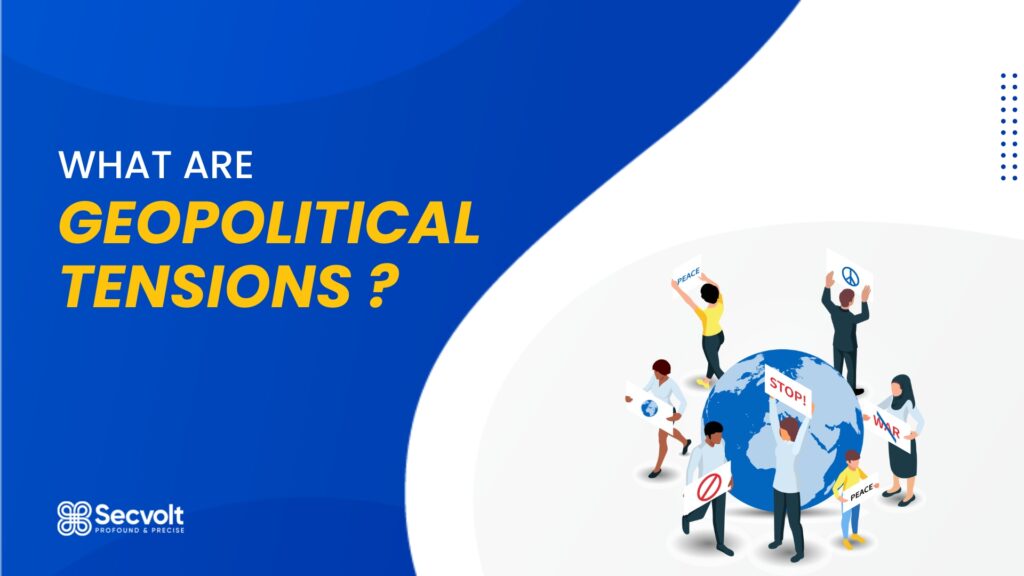
Geopolitical tensions refer to political and economic issues between different countries or regions, which can cause instability in the global economy.
Factors such as trade policies, sanctions, and military conflicts can all contribute to geopolitical tensions. These factors significantly impact financial markets and can trigger a recession.
Let us start by understanding how geopolitical tensions influence the global economic landscape.
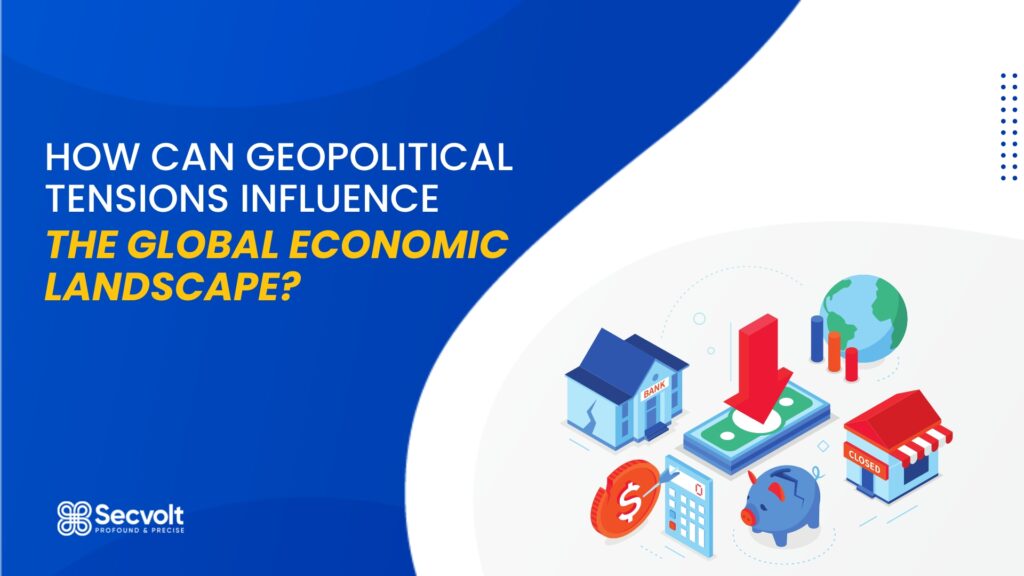
How Can Geopolitical Tensions Influence The Global Economic Landscape?
Geopolitical tensions can significantly impact the global economic landscape, creating uncertainty and volatility in financial markets.
Geopolitical risks can lead to disruptions in trade and investment, which can, in turn, lead to slower economic growth and even recession.
For example, trade disputes and economic sanctions can limit access to markets, reduce business investment, and increase production costs, all of which can negatively impact global economic growth. Military conflicts or other security risks can also disrupt supply chains and cause market disruptions.
Geopolitical tensions can create a “risk-off” sentiment among investors, who may become more cautious and seek safer assets, such as government bonds. This can lead to reduced capital flows to emerging markets, making it more difficult for those countries to finance economic growth.
Next, let us discuss the factors that contribute to these.
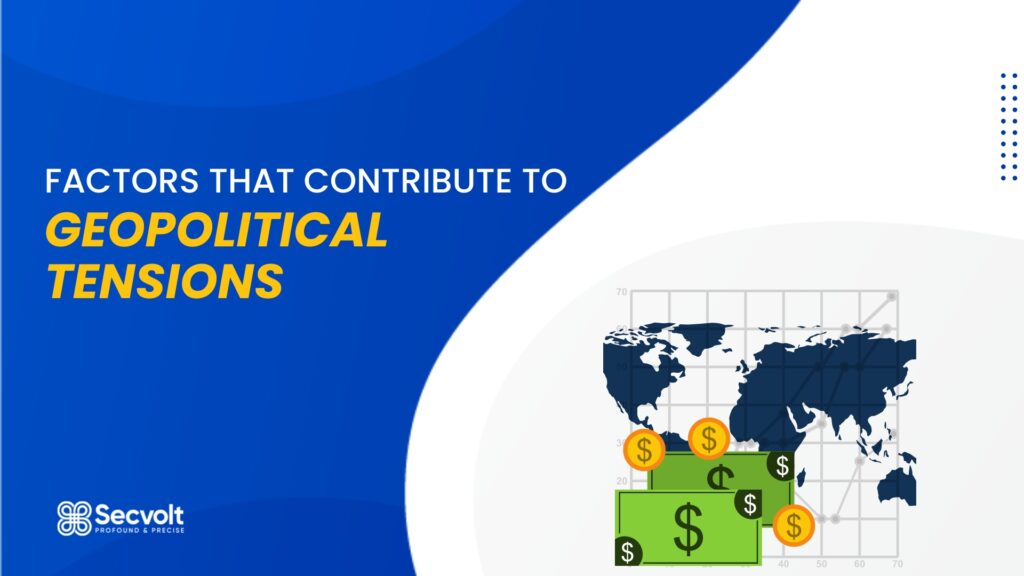
Factors that Contribute to Geopolitical Tensions
Geopolitical tensions can arise from various factors, including economic, political, and security issues. Here are some of the critical factors:
- Trade Risks- Trade disputes, economic sanctions, and other economic issues can lead to tensions between countries. For example, the ongoing trade war between the United States and China has contributed to rising tensions and uncertainty in the global economy. It has the potential to trigger an economic recession in 2023.
- Territorial Disputes- Conflicts over land and resources can create tensions between neighboring countries. For example, the ongoing territorial dispute between China and Japan over the Senkaku/Diaoyu Islands has increased tensions and a potential military conflict.
- Military Conflicts- Wars and other military conflicts can lead to instability and tension in the global economy. For example, the Russia-Ukraine War or the ongoing conflict in Syria has created a refugee crisis and has disrupted global oil markets, contributing to market volatility and uncertainty.
- Political Issues- Political disagreements and conflicts between countries can contribute to geopolitical tensions. For example, disputes over human rights, democracy, and other political issues can lead to economic sanctions and other forms of conflict.
Next, let’s look at some historical events where geopolitical tensions impacted the global economy.
If you need some ideas about what to read next, here they are:
- Avalanche & AVAX: Current & Past Market Performance, Investment Potential in 2023, & Future Outlook
- Why Do Stocks Always Go Down Right After You Buy?
- Fiduciary vs Non-Fiduciary Accounts: Differences & How They Impact The Investors’ Financial Decisions
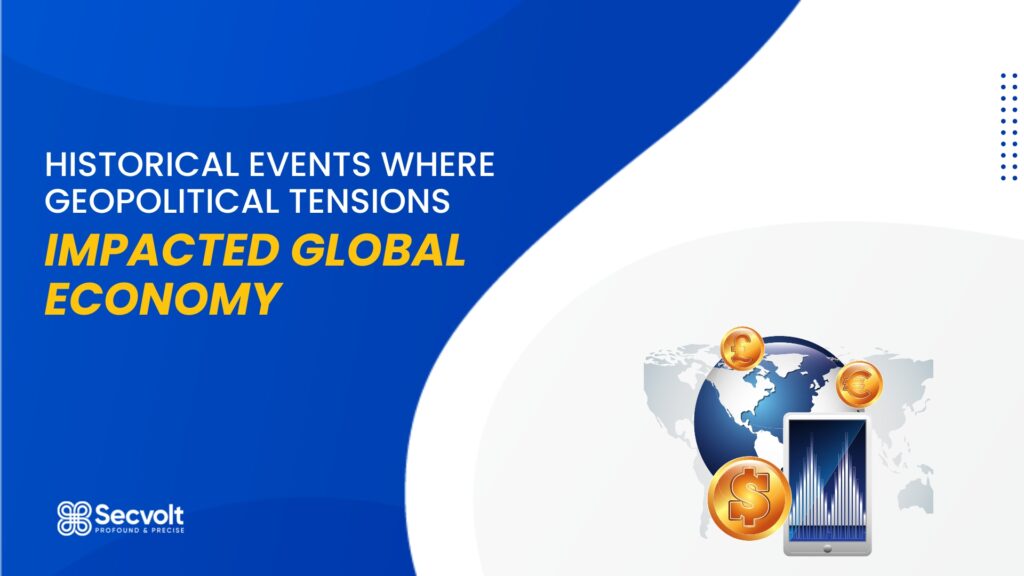
Historical Events Where Geopolitical Tensions Impacted Global Economy
There have been several historical events where geopolitical tensions have had a significant impact on the global economy. Here are some examples:
- Cold War- The Cold War between the United States and the Soviet Union, which lasted from the end of World War II to the early 1990s, created significant geopolitical risk and instability. The arms race and other conflicts between the two superpowers contributed to global instability and created the potential for a catastrophic nuclear war.
- Oil Crises- In the 1970s, geopolitical tensions in the Middle East led to two major oil crises in which oil prices spiked and caused significant economic disruptions. The Arab-Israeli War caused the first crisis, while the Iranian Revolution caused the second.
- 2008 Financial Crisis- The 2008 global financial crisis was partially triggered by geopolitical risk, particularly the collapse of the housing market in the United States. The crisis also exposed weaknesses in the global financial system and led to a significant economic recession.
- US-China Trade War- The ongoing trade war between the United States and China began in 2018 and has created significant geopolitical risk and uncertainty. The trade tensions have led to disruptions in global supply chains, reduced business investment, and potential global economic recession.
These historical events demonstrate how geopolitical tensions can significantly impact the global economy, including economic recession and trade risks.
Now, let us discuss key economic indicators to identify the risk of a recession.
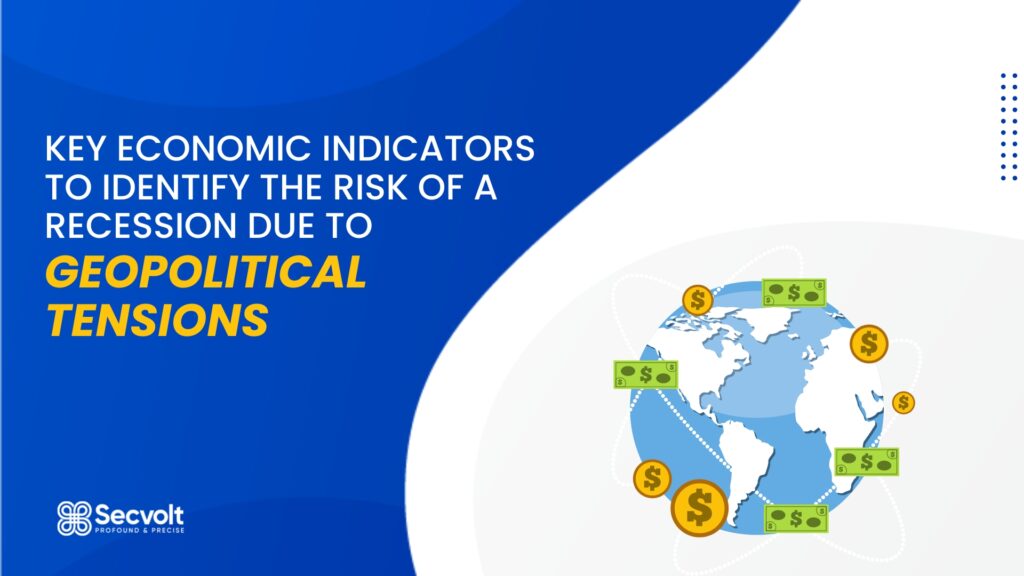
Key Economic Indicators to Identify the Risk of A Recession Due to Geopolitical Tensions
Geopolitical tensions can create significant risks and uncertainties for the global economy and potentially lead to an economic recession. Here are some key economic indicators that can help identify the risk of a recession:
- Global Trade- A decline in global trade volumes can signal to weaken economic activity and indicate that geopolitical tensions negatively impact the global economy. Investors and businesses should keep an eye on global trade data and trends, particularly in critical sectors such as manufacturing and energy.
- Currency Fluctuations- Currency markets can be sensitive to geopolitical risk, and fluctuations in exchange rates can signal uncertainty and risk. Investors should monitor currency markets for signs of instability, like emerging markets or countries with significant geopolitical risks.
- Commodity Prices- Geopolitical tensions can impact the prices of essential commodities such as oil and metals, which can significantly impact the global economy. A sustained increase in commodity prices can indicate risks to global economic stability and may lead to an economic recession.
- Stock Market Volatility- Geopolitical tensions can lead to stock market volatility as investors react to news and events. A sustained period of stock market volatility can indicate that geopolitical risk contributes to market uncertainty and the potential for an economic recession.
Now, you have seen what are the signs that indicate the risk of recession. Next, let us discuss some measures that governments & central banks can take to mitigate the geopolitical tension’s impacts.
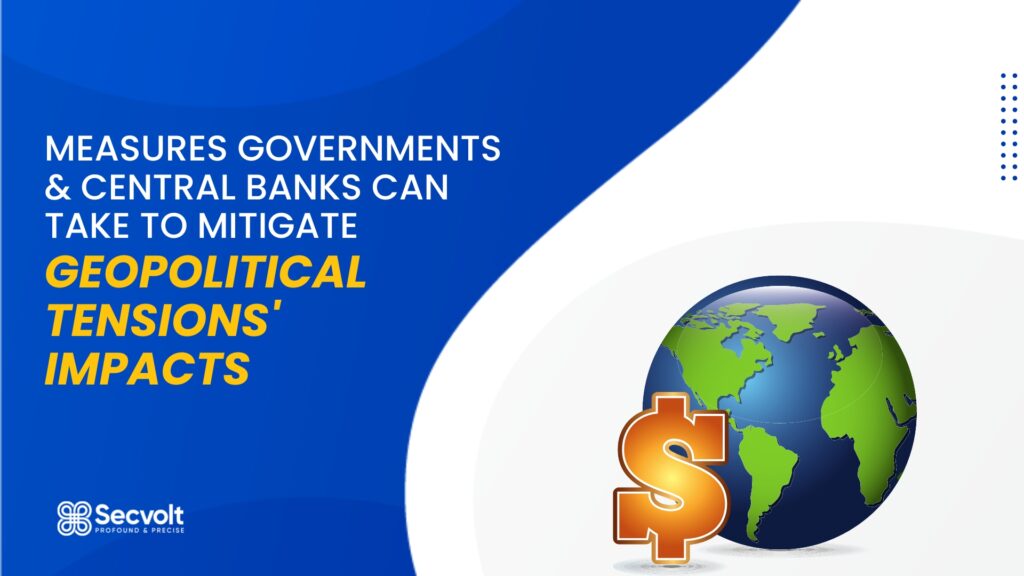
Measures Governments & Central Banks Can Take to Mitigate Geopolitical Tensions’ Impacts
Geopolitical tensions can significantly impact the global economy and potentially lead to a global recession. Governments and central banks can take several measures to mitigate the impact of geopolitical risks on the economy, including:
- Trade Agreements- Governments can work towards resolving trade disputes through negotiations and agreements to reduce trade risks and restore market confidence. Tariff reductions and free trade agreements can also help stimulate economic growth and reduce the risk of a global recession.
- Fiscal Stimulus- Governments can provide fiscal stimulus measures such as tax cuts and infrastructure spending to boost economic growth and reduce the impact of geopolitical risks on the economy. This can include measures to support domestic industries and encourage investment.
- Monetary Policy- Central banks can use monetary policy tools such as interest rate cuts and quantitative easing to stimulate economic growth and support financial stability. This can help to reduce the risk of a global recession in 2023 and manage the impact of geopolitical risks on the financial system.
- Risk Management- Governments and central banks can establish risk management frameworks to monitor and manage geopolitical risks, including the potential impact on financial markets and the economy. This can involve stress testing financial systems to identify vulnerabilities and developing contingency plans to address potential risks.
So, these are some steps central institutions can take to mitigate the impact of geopolitical tensions & geopolitical risks.
The Bottom Line
Geopolitical tensions can significantly impact the global economy and may contribute to a potential global 2023 recession. Businesses and investors should monitor key economic indicators and implement risk management strategies to mitigate the impact of geopolitical risks on their operations.
Meanwhile, governments and central banks can work towards resolving trade disputes and implement fiscal and monetary policies to support economic growth and financial stability. Effective risk management and international cooperation can help reduce the global recession risk and promote economic stability in the face of geopolitical risks.

Frequently Asked Questions
- How does geopolitics affect the economy?
Geopolitics affects the economy by creating geopolitical risks, such as trade conflicts and military tensions, which can disrupt markets, reduce business confidence, and increase uncertainty. This could lead to economic recession, as seen in historical events such as the 2008 global financial crisis.
- What are the major causes of global recession?
The major causes of a global recession in 2023 can include factors such as financial crises, economic imbalances, and geopolitical risks. These can lead to a decline in economic activity, reduced investment, and decreased consumer spending. The 2023 recession is predicted to be driven by a combination of factors, including geopolitical tensions, slow global growth, and supply chain disruptions.
- What is the impact of global recession?
The impact of a global recession can be severe, including job losses, decreased investment, and reduced consumer spending. Economic growth can slow down, and the effects can be felt across different sectors and countries, leading to widespread financial hardship. It can take years to recover from an economic recession, and countries may need to implement significant policy measures to support economic recovery.
Join Our Newsletter
Elevate your financial game & join the ranks of elite investors with Secvolt’s exclusive newsletter.
Join Our Newsletter
Elevate your financial game & join the ranks of elite investors with Secvolt’s exclusive newsletter.
Don’t just dream of wealth; achieve it with Secvolt. Schedule a call today for personalized guidance on your investment strategy and join the ultra-successful.
Ready to unlock your wealth’s truest potential & cherish affluence?
Secvolt, our hedge fund, sets the bar high with a record-breaking performance of 262% returns in 2022. With the brilliance of our highly advanced quant models and the efficiency of our risk mitigation protocols, we are yet to see a loss!
We’re the perfect ally to help you succeed financially and build the lasting legacy you have always aspired for.
Get in touch today. YOUR LEGACY AWAITS YOU…





